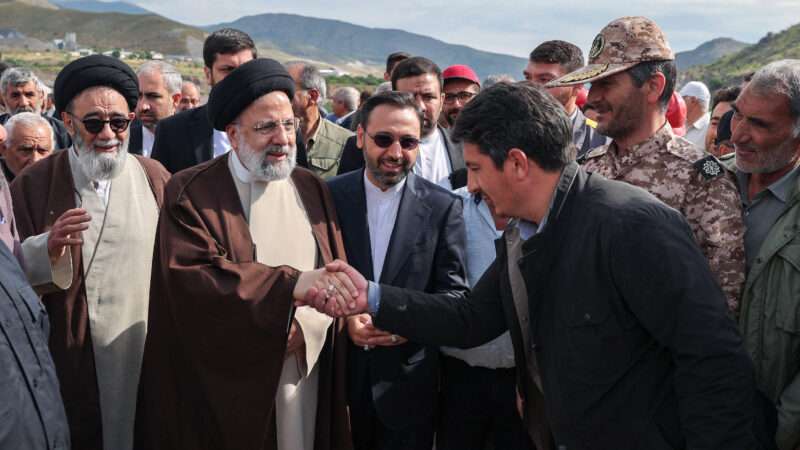
Helicopter deaths: Two of Iran's most influential leaders died in a helicopter crash yesterday, close to the country's border with Azerbaijan. President Ebrahim Raisi—widely seen as second in command, and (until yesterday) the likely successor to the ailing 85-year-old Ayatollah Khamenei—has died, as has Foreign Minister Hossein Amir Abdollahian. State media is blaming their deaths on a "technical failure" of the helicopter as it flew through a mountainous region.
Raisi, nicknamed the "Butcher of Tehran," was responsible for some of the regime's most brutal crackdowns on its critics. Under his leadership, the Mahsa Amini protests for women's rights, including an end to compulsory hijab, were suppressed. He also played key roles in suppressing the 2021–2022 demonstration over water shortages and bad economic conditions and the November 2019 protests over fuel prices, in which roughly 500 people were killed. (Though Raisi only became president in 2021, he was in charge of the judiciary starting in 2019, so some of these things were within his purview before his ascension into greater power.) Earlier in his career, Raisi was part of a small panel that decided to execute 5,000 dissidents during the Iran-Iraq war. The dissidents were not given trials.
The New York Times describes him as a "facilitator of the growing power of the Islamic Revolutionary Guard Corps in Iran's politics and economy." He also helped strengthen Tehran's ties with Russia and China, and emboldened his country's proxies elsewhere in the Middle East.
Bad timing: These two deaths are suboptimally timed, to say the least. After Hamas attacked Israel on October 7, Israel began its subsequent offensive in Gaza, the Iran-backed Hezbollah started firing at Israel from the north, and the Iran-backed Houthis in Yemen started attacking container ships in the region, tensions in the region have been especially high.
Last month, Israel attacked an Iranian embassy building in Syria, killing several military commanders, and Iran responded with an out-in-the-open strike on Israel that did minimal damage but sent a clear message. "Iran's intent was not to provoke a war but only to demonstrate its willingness to attack Israel," Foreign Affairs reported at the time.
Internally, domestic politics are tense right now. There is still widespread anger from the way the Mahsa protests were suppressed, as well as calls for an end to clerical rule. Regime-ordered attacks on dissidents abroad have also increased.
It remains to be seen whether—and how—these two deaths will destabilize Iran, and how that might affect what the ayatollah does not just domestically but internationally.
Scenes from New York:
My favorite movie of all time, Goodfellas, was slapped with a trigger warning by AMC Networks, reports The New York Post.
"This film includes language and/or cultural stereotypes that are inconsistent with today's standards of inclusion and tolerance and may offend some viewers," says the message, which now graces the screen.
Ah, yes: In a movie about mob violence, in which human bodies are found hanging, limp and lifeless, in a meat locker, it's the stereotypes about Italians that are offensive.
QUICK HITS
- "In a country that is supposed to have a gridlocked federal government, the past four years are hard to explain," writes The New York Times' David Leonhardt. "These years have been arguably the most productive period of Washington bipartisanship in decades." Leonhardt attributes this to a new consensus he calls "neopopulism."
- Two priests "based at the diocesan shrine of Our Lady of Fatima in Shumilina, northern Belarus, [are] in custody awaiting trial 'for alleged subversive activities against the Belarusian state.'" Belarus under Alexander Lukashenko has been cracking down on Catholics (and inching closer toward Russia, aiding it in the Ukraine war) for the better part of the last three years.
- "I think we're overestimating the risks to American democracy," Tyler Cowen tells The Generalist. "The intellectual class is way too pessimistic. They're not used to it being rough and tumble, but it's been that way for most of the country's history. It's correct to think that's unpleasant. But by being polarized and shouting at each other, we actually resolve things and eventually move forward. Not always the right way. I don't always like the decisions it makes. But I think American democracy is going to be fine."
- OK, a double helping of Tyler: Will $70,000 baby bonuses help solve South Korea's fertility crisis?
- Yes:
Why does Austin keep going so fucking hard on housing when every other other city known for progressive politics is a horrifically unaffordable nightmare of homelessness that was frozen in amber in the mid 1980s https://t.co/x8lFaJB162
— Swann Marcus (@SwannMarcus89) May 17, 2024
The post Iran's President Dies appeared first on Reason.com.







